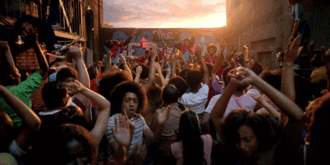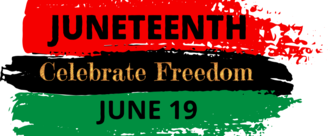- Featured
- Afropunk Army
- Community Control
- Confederate Symbols
- Cop Watch
- Corporate Accountability
- Criminal Justice Policy
- Drop/Bring Charges
- Economic Justice
- Education
- Employment Discrimination
- End The War on Black People
- Environmental Justice
- For-Profit Colleges/Universities
- Gulf Coast
- Housing Rights
- Immigration
- Invest-Divest
- Media Accountability
- Music Industry
- No Guns in Schools
- Open Internet
- Police Accountability
- Political Power
- Pop Culture
- Private Prisons
- Reparations
- Reproductive Justice
- Right Wing Racism
- School-to-Prison Pipeline
- Sports
- Voting Rights
- Wrongful Imprisonment
- More
-
Let NYC Dance: Repeal No-Dancing Law to Create Safe Spaces for Black NYers!New York City brands itself as an entertainment capital, but uses a 90-year-old Cabaret (No-Dancing) Law to keep Black New Yorkers out of dancehalls and to retaliate against restaurant and bar owners who welcome Black patrons. Black New Yorkers are already over-policed in public spaces, and with few private spaces to call our own, we are constantly battling for safe spaces. New York City was built on the creative genius of Black folks, but the city council's enforcement of this law effectively demotes Black people to second class citizens. The Cabaret Law bans dancing in venues that do not have licenses, which are nearly impossible to come by. As of 2016, the NYC Department of Consumer Affairs reported that of NYC's more than 25,000 bars and restaurants, only 118 had Cabaret Licenses. This means that venue owners that support Black culture and allow us dancing without a permit run the risk of being fined, harassed or shut down. These days, because of the No-Dancing Law, Black New Yorkers have even fewer safe spaces. The result: Black people are painted as perpetual “outsiders,” and that puts us in stiffer competition for space in the rapidly gentrifying boroughs. The No-Dancing Law suggests Black people, who are severely over-policed, have just as little right to occupy private space as they do to public space. It implies that Black people are bad for a business’s image or are a financial burden. It also discourages business owners from welcoming Black patrons and encourages hostile behavior toward Black customers. The 1926 Cabaret (No-Dancing) Law The Cabaret Law was originally enacted in 1926 to crack down on African American jazz clubs and kill a legitimate, money-making culture of the Harlem Renaissance. In the 1990s, former mayor and Trump-supporter Rudy Giuliani used the law to crack down on Black and Latino safe spaces as part of his racist “Quality of Life Campaign.” Giuliani wanted to grow the city’s tourism industry and attract more real estate investors, so he he weaponized these laws against Black communities to make out of towners feel "comfortable" Today, the law is a reminder that the City Council and racist mayoral leadership sabotaged Black New Yorkers’ opportunities to create safe spaces for themselves. The law was bundled with a multitude of racist regulations that have since been repealed (or found unconstitutional). But the core of the Cabaret Law is still on the books, and Mayor de Blasio is still enforcing. We are asking our council members to repeal the Cabaret Law and lift this ban on dancing; furthermore, lift the unspoken ban on Black people in private spaces in New York. We are asking the New York City Council to repeal the Cabaret Law and lift this ban on dancing. It's hard to believe that our city government bans an act of expression as basic and universal as dancing--it sounds like the behavior of a repressive regime and certainly has no place in a city as tolerant, diverse, and respectful of human expression as ours is. That’s why we are asking our government to repeal it immediately. Let's take one more step towards becoming the progressive cultural capital all New Yorkers can believe in.4,919 of 5,000 SignaturesCreated by Dance Liberation Network

-
#CelebrateJuneteenth: Make It A National HolidayOn Monday, June 19th, we encourage you to get together with family and friends to celebrate the day the last group of enslaved Black Americans learned they were emancipated. On this day in 1865, Union soldiers in the American Civil War read General Order No. 3 in Galveston, Texas. The order abolished chattel slavery in Texas and brought emancipation to all enslaved Black people throughout the Confederate states. Around the country, Black folks celebrate Juneteenth, sometimes called “Emancipation Day”, with food, song, dance, games, and storytelling. At some of the very first Juneteenth festivals, formerly enslaved Black Americans took turns reciting the Emancipation Proclamation to recall and invoke the spirit of freedom. These days, some examples of Juneteenth celebrations are family barbeques, parades, festivals, and fairs. In some communities, local DJs are even hosting late-night dance parties to bring Juneteenth to more crowds. Independence Day, which celebrates the succession of the former U.S. colonies from British control, overlooks the fact that Black people in America were still enslaved when this holiday started and are still in the fight for basic human rights in this country today. Juneteenth, on the other hand, commemorates the sacrifices of our ancestors and offers a moment to reflect on the work ahead of us. The work that get us ALL free. Texas made Juneteenth a state holiday almost 40 years ago, but government workers are still asked to work on the day of honor. Institutions like the Smithsonian and the Henry Ford Museum have begun to back Juneteenth-centered festivities. Support from major national organizations speaks to the undeniable cultural significance of this day to the entire American community. This Monday, I will be lifting up the people who make me feel courageous and free, and it my hope that you will too. Sign to add your name to this petition to encourage friends, family, and other Color Of Change members to do the same and call for federal recognition of Juneteenth as a National Holiday!3,406 of 4,000 SignaturesCreated by Feminista Jones


